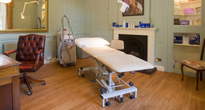Melasma is a skin pigmentation condition which causes patches of grey or brown to develop on the face.
The condition is not medically harmful. It is not a disease, is not contagious or cancerous, can’t be spread and is not itchy or painful. However, the facial discolouration can be quite distressing for those who experience it.
Find out more about melasma and uneven pigmentation.
The good news is there are a few simple measures that you can take to reduce the risk of melasma and now is the time to start.
What causes melasma?
Before outlining our advice, it helps to understand how melasma develops in the first place.
These darker areas of pigmentation are the result of overactive melanocytes – the cells that produce melanin pigmentation.
The most common cause of melasma is sun exposure which causes the melanin production to go into overdrive. Most sufferers find that it looks worse following sun exposure – even with SPF protection and time spent in the shade.
However, there are other factors too. Hormones (e.g. pregnancy/menopause) can be a trigger. In addition, certain medications including contraceptive pill can also cause melasma. There are also genetic issues in that it tends to run in the family.
10 tips to prevent melasma
Our tips to reduce melasma this summer are all about reducing the potential triggers.
- Wear sunscreen with at least SPF 30 every day, even in the winter and on cloudy days.
- Avoid direct sun exposure, especially during midday when the sun’s rays are strongest.
- Wear a broad-brimmed hat and sunglasses to shield your face from the sun.
- Use skincare products that contain antioxidants such as vitamin C and E, which can help protect against sun damage. The higher formulations are prescription only, but can be very effective. Ask about ZO Skin Health.
- Avoid using harsh scrubs and peels, which can worsen pigmentation and exacerbate melasma.
- Use gentle, non-irritating cleansers and skincare products.
- Review use of hormonal contraceptives or hormone replacement therapy and consider alternatives if possible, as they can trigger melasma.
- Limit your exposure to heat and humidity, which can exacerbate melasma.
- Consider using products containing skin brightening agents such as kojic acid, or azelaic acid. Again, these are prescription only and need to be provided under the guidance of a qualified dispenser, such as Mulberry House Clinic.
- Maintain a healthy lifestyle by eating a balanced diet, exercising regularly, and getting enough rest. All of these help to support healthy skin.
Melasma Treatment Options
In addition to the self-help tips, there are also a few professional treatment options that can be considered. These work by stimulating the skin’s renewal processes and patients often report that they are seeing other benefits too, such as reduction in lines and wrinkles.
Exfoliation
Professional exfoliation of the skin’s surface removes the outermost cells that contain the pigment, revealing clearer skin and promoting a more even skin tone. A number of options may help the milder cases of melasma:
- Facial Peels
- Microdermabrasion
- ResurFX laser skin resurfacing
Skin Stimulation
Treatments that promote skin healing and regeneration can be helpful in restoring a more even complexion and skin tone. You may consider:
- Microneedling is a process where the skin is given tiny wounds with sterile needles. This works to help creams or serums penetrate deeper into the skin while also stimulating cell renewal. Mulberry House Clinic offer both Genuine Dermaroller – ideal for larger areas – or Derma FNS (Fractional Needling System), a motorised device which is great for targeting smaller and specific areas of need
- IPL and Photofabulous may be considered in order to target the pigment-producing cells (melanocytes) but this is not always suitable
Skincare Regime
The advances in cosmeceutical skincare mean that effective daily regimes can be used either alongside or instead of professional treatments
- ZO Skin Health is a range that offers extensive options and can help to improve some very challenging skin conditions. It is a prescription-only skincare range, available at Mulberry House Clinic
Melasma Professional Treatment Advice
Dr John Tanqueray, founder of Mulberry House Clinic, says:
“Melasma is difficult to treat successfully. A lot of treatments are promoted for treatment of melasma but in my view few deliver good results (especially things like light peels and microdermabrasion). Laser has risks of either being ineffective or even making the problem worse.
“My first line recommendation is usually to use ZO prescription skincare.”
He also endorses the importance of preventative and maintenance measures:
“Even if you do nothing else be sure to use high factor sunscreen on a daily basis, as there is evidence that this can prevent deterioration and even result in some improvement. Avoid using lightening creams from unknown sources as these can be harmful.
“Even if you are able to achieve a good result with treatment, the problem is a long term one so ongoing maintenance treatment will be necessary to keep that result.”
Mulberry House Clinic
Established 2003
Mulberry House Clinic has an excellent reputation in the Northampton area as an independent, doctor-led practice with vast experience of the industry. Cosmetic skin treatments are carried out by Dr John Tanqueray, who works closely with leading manufacturers to remain at the forefront of the medical aesthetics.
A private consultation is the starting point for all patients in order to facilitate a full discussion about the desired results as well as detailed facial and skin assessment. Find out more about first consultation.
For further information or to arrange a confidential consultation, please complete our contact form, call 01604 702630 or email: info@mulberryhouseclinic.co.uk.






